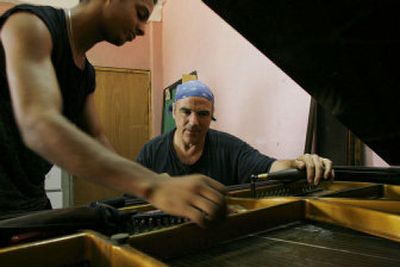American piano tuner hits right notes with Cubans

HAVANA – When Benjamin Treuhaft first visited Cuba in 1993, he found that aging American cars weren’t the only clunkers on the island. Years of neglect, humidity and termites were ravaging the dwindling piano population.
Thirteen years later, the American piano tuner has helped send 237 old pianos donated by Americans to the communist-run island, filling a void in a musical country.
“Most of the pianos here were Soviet-made: many of them from Moscow and Estonia, so they weren’t that great to begin with,” Treuhaft said during a visit this week. “Then, they met the Cuban termites. And then, they met the Cuban pianists, who are great, but strong, and can really destroy an instrument.”
Treuhaft keeps returning to survey donated instruments and tune and restore others, striking an insistent chord against the U.S. trade embargo. After nearly 20 trips to the island – some without U.S. approval – the jocular former hippie who sports a bandanna on his head and likes to tune pianos barefoot is now a personality in some Cuban music circles.
After Treuhaft repaired Jorge Lopez Marin’s dilapidated Russian piano, the Havana composer wrote a traditional Cuban song for him called “El Medico de Piano” – or “The Piano Doctor.” The tune is now widely performed by a popular women’s musical group.
“What he has done is very important for the music community in Cuba,” said Julia Diaz, a Cuban piano tuner who has known Treuhaft for 12 years. “He is very much beloved here.”
Treuhaft, who was returning to the United States on Friday, said he has U.S. Treasury Department approval to legally visit Cuba to check on the donated pianos. He said he exported the donated instruments with approval of the U.S. Commerce Department, which curiously granted a license through its Office of Missile and Nuclear Technology.
But for this trip, he said, “I left my license at home.”
Treuhaft said he isn’t worried about the possibility of being fined for his latest trip, which he described as an “act of civil disobedience” against American rules he says violate his constitutional right to travel.
Treuhaft was contacted by Treasury officials after an unauthorized visit in 1994. Treuhaft was fined $10,000, later dropped to $3,500, which he refused to pay. The case remains open.
Treasury Department spokeswoman Molly Millerwise declined to comment on Treuhaft’s case because of privacy issues.
Although Treuhaft doesn’t consider himself political, he said his defiance of the U.S. embargo may be explained by his background.
The 58-year-old was raised in the San Francisco Bay Area by activist parents who were Communist Party members in the 1950s.
His mother was Jessica Mitford, whose book “The American Way of Death” criticized the funeral industry. His father was Oakland civil rights attorney Richard Treuhaft.
Treuhaft said his parents, who died in recent years, loved his “Send a Piana to Havana” project, its name written in American vernacular to make it rhyme. “They would make their leftist friends donate thousands of dollars,” he recalled.
Treuhaft now has a young Hungarian wife and a baby daughter. For this trip, they stayed in New York, where Treuhaft now operates his Underwater Piano Shop in the East Village.